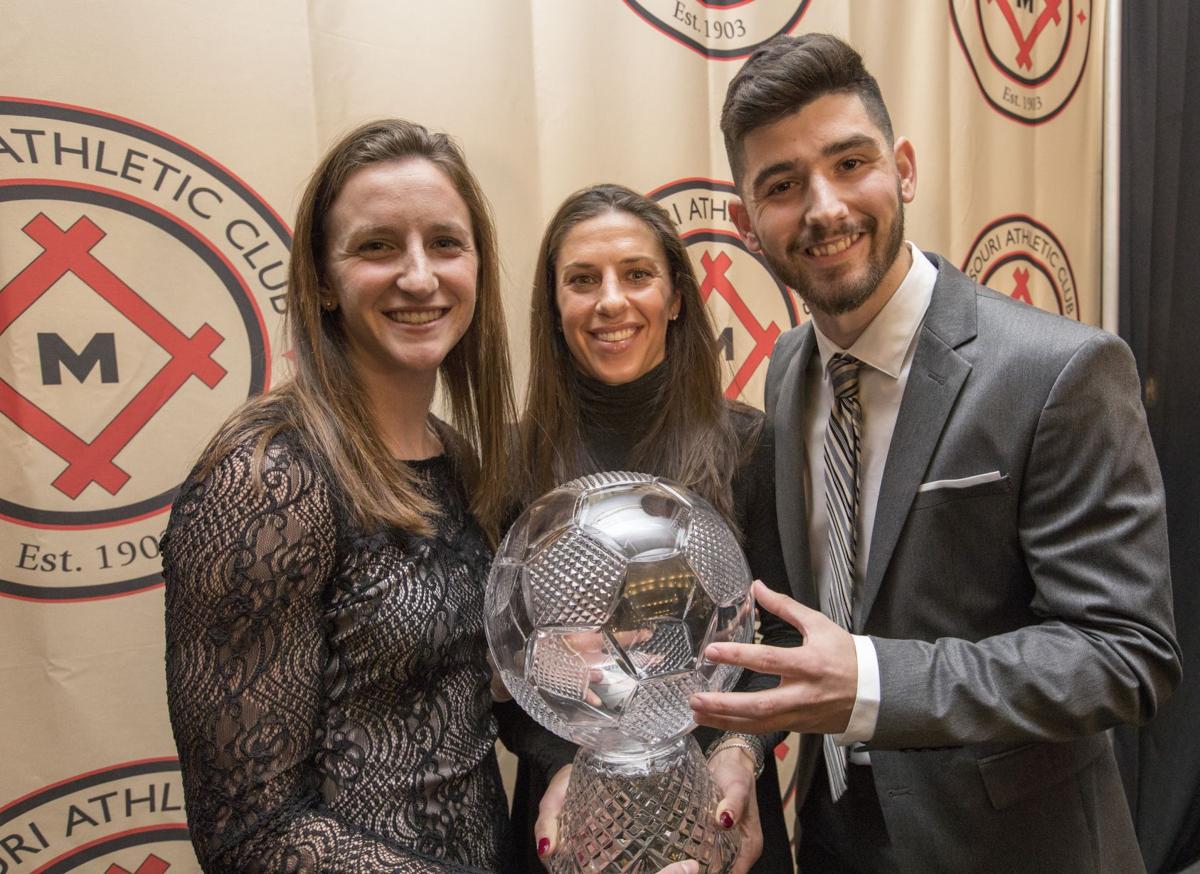A year ago, Andi Sullivan came to the Missouri Athletic Club’s Hermann Trophy presentation feeling a little shaky.
In October, while still a college junior, she had made her debut with the U.S. women’s national team. She played for the U.S. on Nov. 13 and then five days later, she was back on the field at Stanford and the Cardinal looked ready to make a run at the national championship.
But on Nov. 18, in a game against Santa Clara in the NCAA tournament, Sullivan tore her ACL. Her season was over, her national team career put on hold. She was a Hermann finalist that year and came to St. Louis for the ceremony, but she didn’t win.
“Last year when I came to this event I was super thankful to be included and I was very surprised,” she said Friday. “When I came to the event, I was barely walking on my own and I was down in the dumps. Coming to this event really lifted my spirits and motivated me so I’m very thankful to this event because I think it did a lot for me in terms of my recovery and getting back and playing.”
Sullivan was back at the MAC on Friday, this time to take home the honor as the nation’s top female collegiate soccer player. Sullivan, a midfielder, had three goals and six assists and was captain of the Stanford team that won the national championship. She leaves early Saturday morning to fly back to Los Angeles for the U.S. women’s team’s first camp of 2018.
For Sullivan, it was a long road back to the MAC, and to health.
“I think it was a tough journey,” said Stanford coach Paul Ratcliffe, “but it’s a testament to her work ethic, her determination that she came back even stronger and led us to a national championship. It’s a storybook ending for her.”
“It was extremely tough,” Sullivan said. “It’s very long and there are lots of hard times. I tried to focus on it as a learning experience, I think I learned a lot about myself and about recovery and about soccer. I felt very lucky to have the support system I had at Stanford.”
Sullivan had some teammates who had gone through it, and even though she was a newcomer to the national team, she got guidance and support from players there such as national team standout Megan Rapinoe, who had gone through similar injuries.
“I still feel like I’m building,” Sullivan said. “I still feel like I have room to grow. I think it took time but by the end of the season, I was doing things that I expected myself to do, but I still know I have more to give.”
Jon Bakero, a forward from Wake Forest, won the men’s award. The native of Spain — his father played for Barcelona and was on the Spanish team at the 1990 and 1994 World Cups — had 16 goals and 14 assists to lead the nation in scoring. His next stop is the Major League Soccer combine in Orlando, Fla.
“Scoring goals is one thing, but what he did for me as a captain and a leader in the locker room and on the field is something I haven’t seen in a long time,” said Wake Forest coach Bobby Muuss. “That’s why I’m so happy for him. He’s just a normal person with a great personality and respect for everybody he comes in contact with. … He’s probably had the biggest growth in a player that I’ve ever seen, personally, academically, language, and on the field. His increased athleticism, his work rate, his ability to play the game. I’ve never seen it. If people like to bash college soccer about development, if you look at Jon four years ago and you look at Jon right now, I think they’d think a totally different thing.”
Bakero moved around as his father, Jose Mari Bakero, had various coaching jobs after his playing career was over. Then he decided to make a major move of his own, leaving Barcelona to go to college in Winston-Salem, N.C.
“For a new opportunity,” he said. “In Spain, everyone just wants to play professionally and they forget about the importance of school and getting a degree, and here I could do both, get my degree and play at a very high level. It definitely was a great fit for me.”
Though his father is now head of Barcelona’s youth academy, he stayed away from coaching his son, though Muuss said it’s clear that Bakero is a coach’s son.
“When I was younger, he never wanted to pressure me,” Bakero said. “He let me do my thing and once he saw I loved soccer as much as he did, he’s been a great supporter in giving me tips on what to do. … If I loved soccer, I should play soccer, but he didn’t want people to think I played because he played.”
